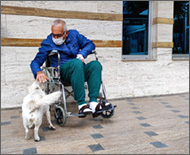WSJ Covers Tech Tools for Protecting Families
EVERSAFE AND OTHER SILVERTECH SERVICES FEATURED
The Wall Street Journal started the new year with two articles focused on how tech tools can help take care of family members. Family and Tech Writer Julie Jargon’s first article is a look at how caregivers can protect aging parents when they “can’t be there” in person–especially important as we await the widespread distribution of COVID vaccines. As Ms. Jargon notes: “Caring for aging loved ones has always been difficult, and the pandemic has only complicated it–especially when family members live in different cities or states.” As more of us find ourselves in caregiving roles, technology tools are an important way to keep an eye on loved ones–from a distance. The piece recommends that caregivers start by assessing areas in which older family members  may need some assistance. New tech tools run the gamut. They range from “sensors that alert you when the person gets out of bed in the morning to smart pill-dispensers that notify you if your loved ones haven’t taken their medication…” One tech service now specializes in enabling seniors without a smartphone to order a ride by phone.
may need some assistance. New tech tools run the gamut. They range from “sensors that alert you when the person gets out of bed in the morning to smart pill-dispensers that notify you if your loved ones haven’t taken their medication…” One tech service now specializes in enabling seniors without a smartphone to order a ride by phone.
In her second piece, Ms. Jargon focuses on fintech (financial technology) services that monitor not just physical health–but financial health, as well. “How to Protect Seniors from Online Fraud and Phone Scams” outlines several tech services that can be used proactively to protect the financial health of seniors. Call blockers, junk email diverters and EverSafe’s financial monitoring were highlighted as good ways to protect loved ones’ assets and promote financial independence. The piece emphasized that credit monitoring is limited in its effectiveness to detect fraud. Exploiters often target checking, savings, investment, and credit card accounts. Monitoring activity across financial accounts as well as credit data provides the best protection.
GOVERNMENT / LEGISLATIVE UPDATE
DEPARTMENT OF LABOR ISSUES REPORT ON DIMINISHED CAPACITY
A Department of Labor advisory council recently compiled a report focused on identifying cognitive decline in retirees. The research, submitted to the previous Department of Labor Secretary (Eugene Scalia), is focused on the growing  number of older employees who may be facing challenges associated with diminished financial capacity. The report, entitled “Considerations for Recognizing and Addressing Participants With Diminished Capacity,” includes testimony from experts on aging, retirement benefits, elder fraud, and financial services. Diminished financial capacity is a growing concern for investment firms and employers as they asses the risks to employees enrolled in their retirement plans. The Council made a number of recommendations in their report. They include: publishing information on diminished capacity for fiduciaries, plan sponsors, and providers; reviewing best practices recommended by the financial services industry on this issue; and “imposing reasonable temporary restrictions… to prevent the distribution of assets when participants exhibit signs of diminished capacity or financial exploitation.”
number of older employees who may be facing challenges associated with diminished financial capacity. The report, entitled “Considerations for Recognizing and Addressing Participants With Diminished Capacity,” includes testimony from experts on aging, retirement benefits, elder fraud, and financial services. Diminished financial capacity is a growing concern for investment firms and employers as they asses the risks to employees enrolled in their retirement plans. The Council made a number of recommendations in their report. They include: publishing information on diminished capacity for fiduciaries, plan sponsors, and providers; reviewing best practices recommended by the financial services industry on this issue; and “imposing reasonable temporary restrictions… to prevent the distribution of assets when participants exhibit signs of diminished capacity or financial exploitation.”
COVID Vaccines Are Now Available
ARE THEY JUST AS EFFECTIVE FOR SENIORS?
As we all know, seniors are at an increased risk of being hospitalized and dying from COVID-19. For this reason, the CDC recommends that states prioritize inoculations for people age 65 and older, as well as those who reside in long-term care facilities. But are the COVID vaccines safe for seniors? The European Medicines Agency is expected to authorize the AstraZeneca COVID vaccine this month–a few weeks after it was approved for use in the UK. According to an article in The  Guardian, this vaccine may be not be authorized for seniors in the European Union because there is “insufficient data on how well it works in the over-65s,” the agency head suggested. The Astra Zeneca has not been approved in the US. The Food and Drug Administration has approved two COVID-19 vaccines: the Pfizer/BioNTech COVID-19 vaccine and the Moderna COVID-19 vaccine. A recent study in the Journal of the American Medical Association indicated that seniors were not included in a number of COVID vaccine trials to the same extent as younger individuals. This is not uncommon when vaccines are being tested, according to Ardeshir Hashimi, MD, a geriatric specialist from the Cleveland Clinic Center for Geriatric Medicine. In a piece in VeryWellHealth.com, Dr. Hashimi suggests that seniors often express anxiety about the “safety, adverse side effects, and efficacy” of vaccines. Consent to participate in the trial may be problematic if the applicant has any problems with cognition, according to the article. That being said, both the Pfizer and Moderna vaccines have proven to be effective for older adults. According to an analysis of the Moderna COVID vaccine trial in the New England Journal of Medicine, patients 18 to 65 demonstrated an efficacy of 95.6%, while the rate was 86.4% for those over 65 years of age. Pfizer states that their efficacy is over 94% in the over-65s.
Guardian, this vaccine may be not be authorized for seniors in the European Union because there is “insufficient data on how well it works in the over-65s,” the agency head suggested. The Astra Zeneca has not been approved in the US. The Food and Drug Administration has approved two COVID-19 vaccines: the Pfizer/BioNTech COVID-19 vaccine and the Moderna COVID-19 vaccine. A recent study in the Journal of the American Medical Association indicated that seniors were not included in a number of COVID vaccine trials to the same extent as younger individuals. This is not uncommon when vaccines are being tested, according to Ardeshir Hashimi, MD, a geriatric specialist from the Cleveland Clinic Center for Geriatric Medicine. In a piece in VeryWellHealth.com, Dr. Hashimi suggests that seniors often express anxiety about the “safety, adverse side effects, and efficacy” of vaccines. Consent to participate in the trial may be problematic if the applicant has any problems with cognition, according to the article. That being said, both the Pfizer and Moderna vaccines have proven to be effective for older adults. According to an analysis of the Moderna COVID vaccine trial in the New England Journal of Medicine, patients 18 to 65 demonstrated an efficacy of 95.6%, while the rate was 86.4% for those over 65 years of age. Pfizer states that their efficacy is over 94% in the over-65s.
SCAM ALERT
THEFT OF UNEMPLOYMENT BENEFITS
Theft of unemployment benefits may be the largest scale fraud operation since the start of the pandemic. The U.S. has lost an estimated $36 billion, most of which involved fraudulent claims submitted to the Pandemic Unemployment Assistance program (“PAU”). This program was developed to provide benefits to individuals who don’t qualify for traditional unemployment insurance – including independent contractors, small business owners, and gig workers. Recipients can currently get up to $750 a week in benefits. “This is the largest fraud attack on the U.S. ever…” according to the founder of ID.me, an identity verification service for state unemployment agencies. According to a California newspaper, prosecutors report that dozens of prison inmates have been engaged in such a scheme, in which stolen cell phones are used to “illegally acquire unemployment benefits for themselves and outside accomplices.” The most common of these scams is straightforward: the fraudster steals personal data and files a phony claim in someone else’s name. In a recent case, reported to EverSafe, the scammer forgot to insert a phony address on the false insurance claim – and so authorities were quickly alerted to the fraud by the victim. New security measures that confirm the legitimacy of these claims are now in place, while officials distribute much-needed benefits to those who qualify.
Pets and Seniors
DOG DEMONSTRATES LOYALTY TO OLDER PATIENT
 It is well-founded that companion animals reduce depression and loneliness in socially isolated older adults. This is all the more reason why pets can be life-changing for homebound seniors as the pandemic persists. A wonderful story illustrates how having a pet improves one’s chance to survive a significant illness. It involves a senior from Turkey who was recently hospitalized for a blood clot in
It is well-founded that companion animals reduce depression and loneliness in socially isolated older adults. This is all the more reason why pets can be life-changing for homebound seniors as the pandemic persists. A wonderful story illustrates how having a pet improves one’s chance to survive a significant illness. It involves a senior from Turkey who was recently hospitalized for a blood clot in his brain. The older patient’s dog, Boncuk, accompanied his daughter when she took her father to the Turkish hospital. According to the piece, “Boncuk showed his loyalty this way. Boncuk looked around and started to cry when my father called out his name while getting treatment in the hospital room. We were surprised.” She added that despite their attempts to take the dog home, Boncuk routinely returned to the hospital on his own. Boncuk and his owner, Cemal, are now doing fine.
his brain. The older patient’s dog, Boncuk, accompanied his daughter when she took her father to the Turkish hospital. According to the piece, “Boncuk showed his loyalty this way. Boncuk looked around and started to cry when my father called out his name while getting treatment in the hospital room. We were surprised.” She added that despite their attempts to take the dog home, Boncuk routinely returned to the hospital on his own. Boncuk and his owner, Cemal, are now doing fine.